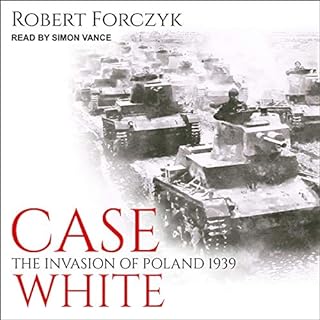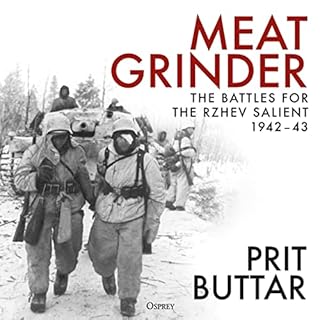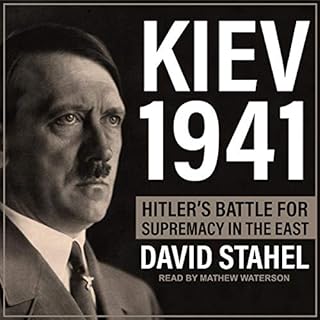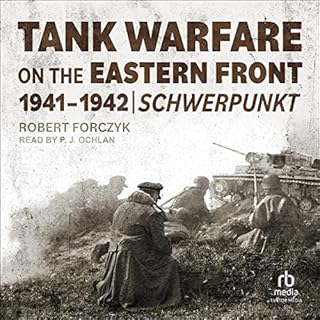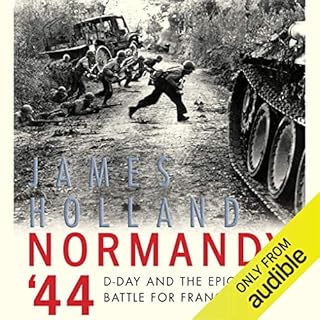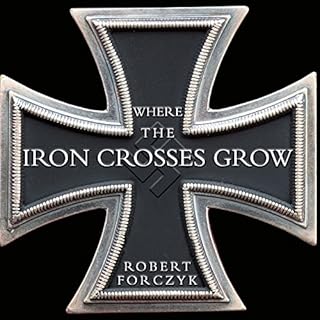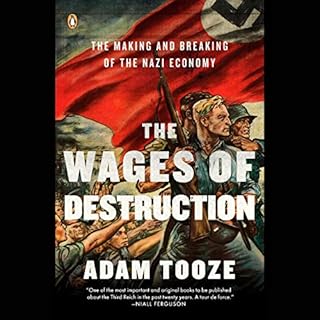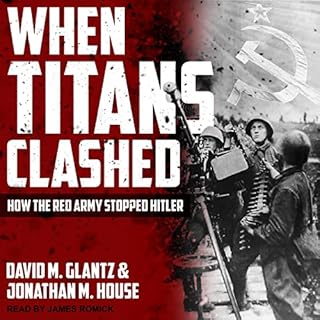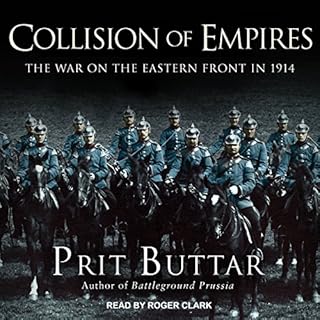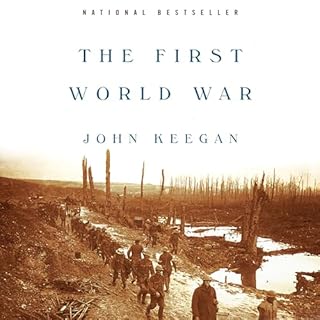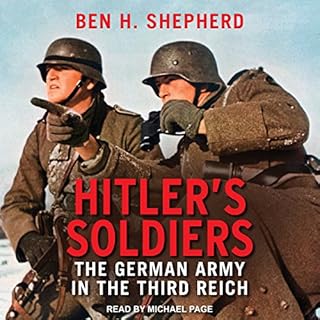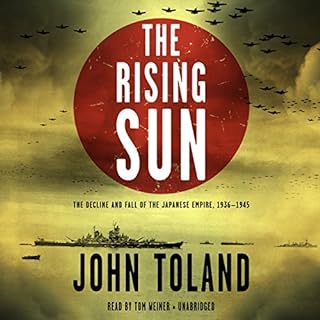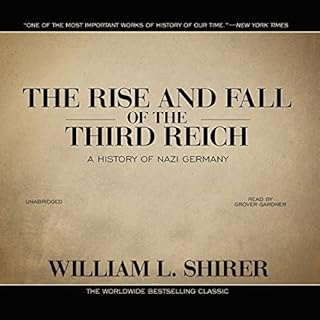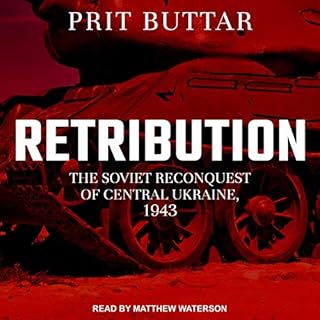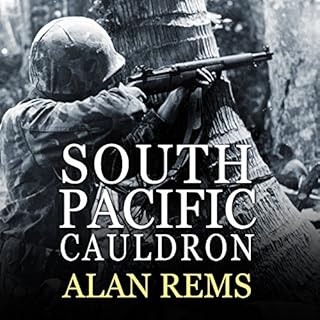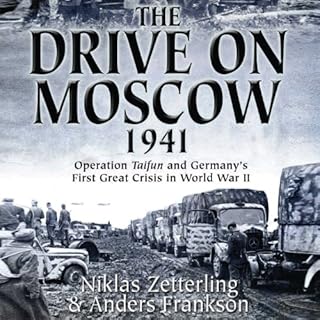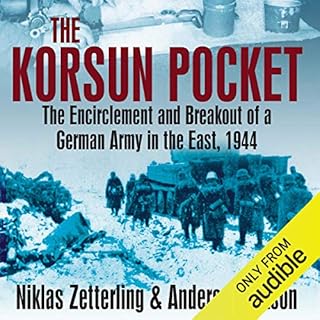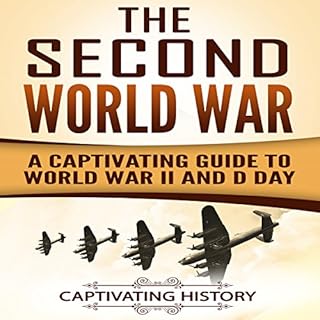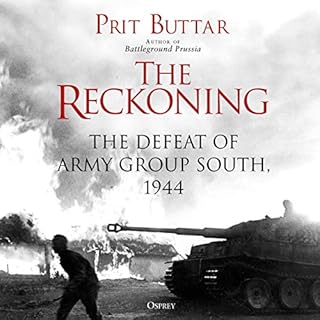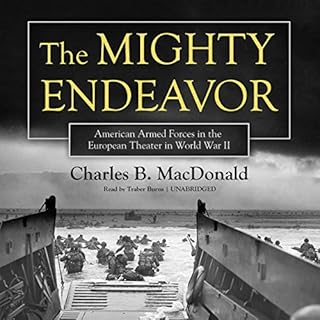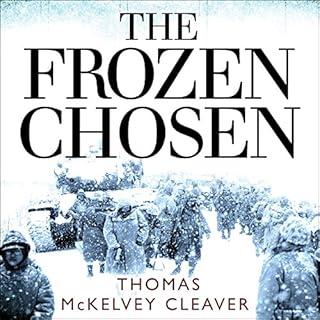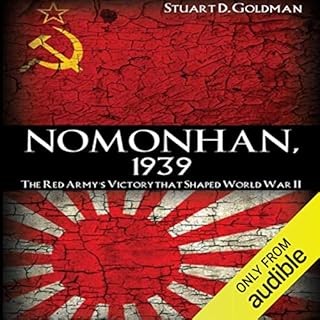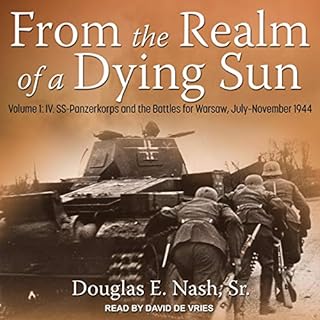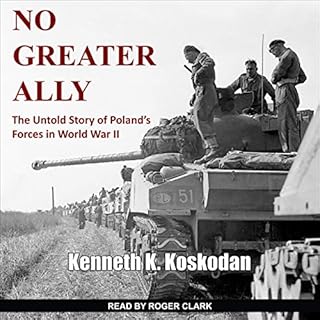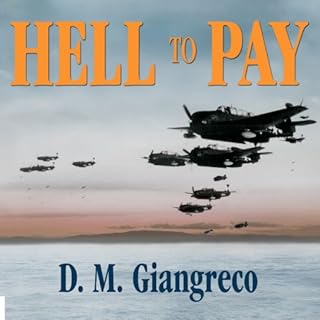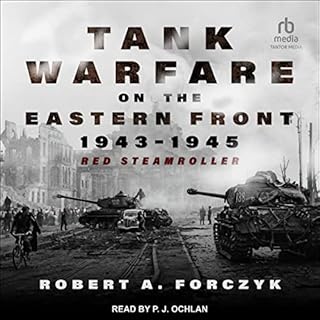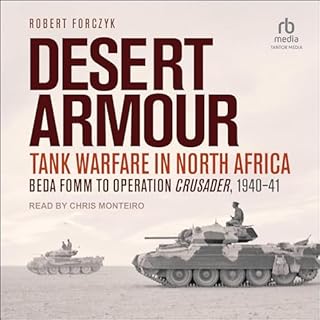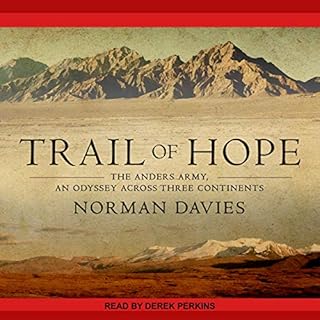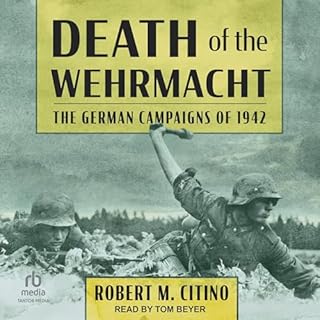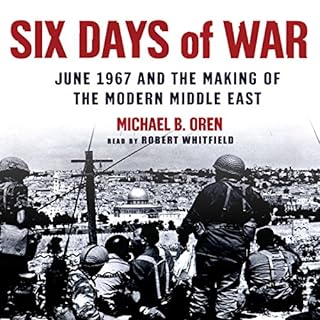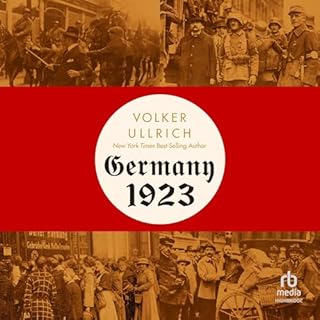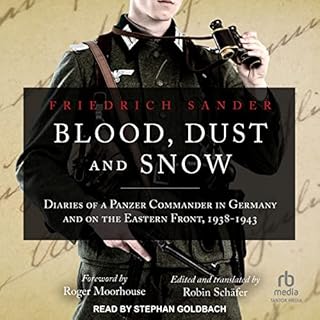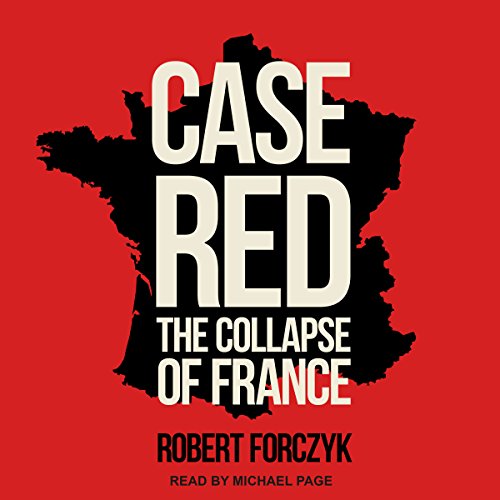
Case Red
The Collapse of France
Failed to add items
Add to Cart failed.
Add to Wish List failed.
Remove from wishlist failed.
Adding to library failed
Follow podcast failed
Unfollow podcast failed
Buy for $18.05
No default payment method selected.
We are sorry. We are not allowed to sell this product with the selected payment method
-
Narrated by:
-
Michael Page
-
By:
-
Robert Forczyk
About this listen
Even after the legendary evacuation from Dunkirk in June 1940 there were still large British formations fighting the Germans alongside their French allies. After mounting a vigorous counterattack at Abbeville and then engaging a tough defense along the Somme, the British were forced to conduct a second evacuation from the ports of Le Havre, Cherbourg, Brest, and St. Nazaire.
While France was in its death throes, politicians and soldiers debated what to do - flee to England or North Africa, to seek an armistice. Case Red captures the drama of the final three weeks of military operations in France in June 1940, and explains the great impact it had on the course of relations between Britain and France during the remainder of the war. It also addresses the military, political, and human drama of France's collapse in June 1940, and how the windfall of captured military equipment, fuel, and industrial resources enhanced the Third Reich's ability to attack its next foe - the Soviet Union.
©2017 Robert Forczyk (P)2017 TantorListeners also enjoyed...
-
Case White
- The Invasion of Poland 1939
- By: Robert Forczyk
- Narrated by: Simon Vance
- Length: 15 hrs and 31 mins
- Unabridged
-
Overall4.5 out of 5 stars 172
-
Performance4.5 out of 5 stars 145
-
Story4.5 out of 5 stars 145
The German invasion of Poland on 1 September, 1939, designated as Fall Weiss (Case White), was the event that sparked the outbreak of World War II in Europe. The campaign has widely been described as a textbook example of Blitzkrieg, but it was actually a fairly conventional campaign as the Wehrmacht was still learning how to use its new Panzers and dive-bombers. The Polish military is often misrepresented as hopelessly obsolete and outclassed by the Wehrmacht, yet in fact it was well-equipped with modern weapons and armor.
-
3 out of 5 stars
-
Surprise
- By Kindle Customer on 11-24-19
By: Robert Forczyk
-
Meat Grinder
- The Battles for the Rzhev Salient, 1942–43
- By: Prit Buttar
- Narrated by: Nathan Osgood
- Length: 21 hrs and 3 mins
- Unabridged
-
Overall4.5 out of 5 stars 54
-
Performance4 out of 5 stars 48
-
Story4.5 out of 5 stars 48
The fighting between the German and Russian armies in the Rzhev Salient during World War II was so grisly, so murderous, and saw such vast losses that the troops called the campaign 'The Meat Grinder'. Though millions of men would fight and die there, the Rzhev Salient does not have the name recognition of Leningrad or Moscow. It has been largely ignored by Western historians – until now.
-
4 out of 5 stars
-
A totally absurd effort in racist German Bashing with some grudging respect for the German soldier and German Army.
- By Anonymous User on 05-01-24
By: Prit Buttar
-
Operation Barbarossa and Germany's Defeat in the East
- By: David Stahel
- Narrated by: Stewart Crank
- Length: 17 hrs and 41 mins
- Unabridged
-
Overall4.5 out of 5 stars 269
-
Performance4.5 out of 5 stars 241
-
Story4.5 out of 5 stars 236
Using archival records, in this book, David Stahel presents a history of Germany's summer campaign from the perspective of the two largest and most powerful Panzer groups on the Eastern front. Stahel's research provides a fundamental reassessment of Germany's war against the Soviet Union, highlighting the prodigious internal problems of the vital Panzer forces and revealing that their demise in the earliest phase of the war undermined the whole German invasion.
-
5 out of 5 stars
-
Best book on Operation Barbarossa so far
- By Amazon Customer on 09-14-21
By: David Stahel
-
Kiev 1941
- Hitler's Battle for Supremacy in the East
- By: David Stahel
- Narrated by: Matthew Waterson
- Length: 14 hrs and 1 min
- Unabridged
-
Overall4.5 out of 5 stars 217
-
Performance4.5 out of 5 stars 194
-
Story4.5 out of 5 stars 191
In just four weeks in the summer of 1941 the German Wehrmacht wrought unprecedented destruction on four Soviet armies, conquering central Ukraine and killing or capturing three quarters of a million men. This was the Battle of Kiev - one of the largest and most decisive battles of World War II and, for Hitler and Stalin, a battle of crucial importance. For the first time, David Stahel charts the battle's dramatic course and aftermath.
-
5 out of 5 stars
-
The book you must read on Hitler's War with Russia
- By Kindle Customer on 05-28-19
By: David Stahel
-
Tank Warfare on the Eastern Front, 1941-1942
- Schwerpunkt
- By: Robert A. Forczyk
- Narrated by: P.J. Ochlan
- Length: 16 hrs and 10 mins
- Unabridged
-
Overall4.5 out of 5 stars 30
-
Performance4.5 out of 5 stars 28
-
Story4.5 out of 5 stars 28
Robert Forczyk's incisive study offers fresh insight into how the two most powerful mechanized armies of WWII developed their tactics and weaponry during the early years of the Russo-German War. He uses German, Russian, and English sources to provide the first comprehensive overview and analysis of armored warfare from the German and Soviet perspectives.
-
5 out of 5 stars
-
A Great work on tank warfare
- By Anonymous User on 03-22-24
-
Normandy '44
- D-Day and the Epic 77-Day Battle for France
- By: James Holland
- Narrated by: John Sackville
- Length: 24 hrs and 20 mins
- Unabridged
-
Overall4.5 out of 5 stars 547
-
Performance4.5 out of 5 stars 488
-
Story4.5 out of 5 stars 483
D-Day, June 6, 1944, and the 76 days of bitter fighting in Normandy that followed the Allied landing, have become the defining episode of World War II in the west - the object of books, films, television series, and documentaries. Yet as familiar as it is, as James Holland makes clear in his definitive history, many parts of the OVERLORD campaign, as it was known, are still shrouded in myth and assumed knowledge.
-
5 out of 5 stars
-
Excellent account of Normandy but be weary...
- By S. H. Moore on 02-22-20
By: James Holland
-
Case White
- The Invasion of Poland 1939
- By: Robert Forczyk
- Narrated by: Simon Vance
- Length: 15 hrs and 31 mins
- Unabridged
-
Overall4.5 out of 5 stars 172
-
Performance4.5 out of 5 stars 145
-
Story4.5 out of 5 stars 145
The German invasion of Poland on 1 September, 1939, designated as Fall Weiss (Case White), was the event that sparked the outbreak of World War II in Europe. The campaign has widely been described as a textbook example of Blitzkrieg, but it was actually a fairly conventional campaign as the Wehrmacht was still learning how to use its new Panzers and dive-bombers. The Polish military is often misrepresented as hopelessly obsolete and outclassed by the Wehrmacht, yet in fact it was well-equipped with modern weapons and armor.
-
3 out of 5 stars
-
Surprise
- By Kindle Customer on 11-24-19
By: Robert Forczyk
-
Meat Grinder
- The Battles for the Rzhev Salient, 1942–43
- By: Prit Buttar
- Narrated by: Nathan Osgood
- Length: 21 hrs and 3 mins
- Unabridged
-
Overall4.5 out of 5 stars 54
-
Performance4 out of 5 stars 48
-
Story4.5 out of 5 stars 48
The fighting between the German and Russian armies in the Rzhev Salient during World War II was so grisly, so murderous, and saw such vast losses that the troops called the campaign 'The Meat Grinder'. Though millions of men would fight and die there, the Rzhev Salient does not have the name recognition of Leningrad or Moscow. It has been largely ignored by Western historians – until now.
-
4 out of 5 stars
-
A totally absurd effort in racist German Bashing with some grudging respect for the German soldier and German Army.
- By Anonymous User on 05-01-24
By: Prit Buttar
-
Operation Barbarossa and Germany's Defeat in the East
- By: David Stahel
- Narrated by: Stewart Crank
- Length: 17 hrs and 41 mins
- Unabridged
-
Overall4.5 out of 5 stars 269
-
Performance4.5 out of 5 stars 241
-
Story4.5 out of 5 stars 236
Using archival records, in this book, David Stahel presents a history of Germany's summer campaign from the perspective of the two largest and most powerful Panzer groups on the Eastern front. Stahel's research provides a fundamental reassessment of Germany's war against the Soviet Union, highlighting the prodigious internal problems of the vital Panzer forces and revealing that their demise in the earliest phase of the war undermined the whole German invasion.
-
5 out of 5 stars
-
Best book on Operation Barbarossa so far
- By Amazon Customer on 09-14-21
By: David Stahel
-
Kiev 1941
- Hitler's Battle for Supremacy in the East
- By: David Stahel
- Narrated by: Matthew Waterson
- Length: 14 hrs and 1 min
- Unabridged
-
Overall4.5 out of 5 stars 217
-
Performance4.5 out of 5 stars 194
-
Story4.5 out of 5 stars 191
In just four weeks in the summer of 1941 the German Wehrmacht wrought unprecedented destruction on four Soviet armies, conquering central Ukraine and killing or capturing three quarters of a million men. This was the Battle of Kiev - one of the largest and most decisive battles of World War II and, for Hitler and Stalin, a battle of crucial importance. For the first time, David Stahel charts the battle's dramatic course and aftermath.
-
5 out of 5 stars
-
The book you must read on Hitler's War with Russia
- By Kindle Customer on 05-28-19
By: David Stahel
-
Tank Warfare on the Eastern Front, 1941-1942
- Schwerpunkt
- By: Robert A. Forczyk
- Narrated by: P.J. Ochlan
- Length: 16 hrs and 10 mins
- Unabridged
-
Overall4.5 out of 5 stars 30
-
Performance4.5 out of 5 stars 28
-
Story4.5 out of 5 stars 28
Robert Forczyk's incisive study offers fresh insight into how the two most powerful mechanized armies of WWII developed their tactics and weaponry during the early years of the Russo-German War. He uses German, Russian, and English sources to provide the first comprehensive overview and analysis of armored warfare from the German and Soviet perspectives.
-
5 out of 5 stars
-
A Great work on tank warfare
- By Anonymous User on 03-22-24
-
Normandy '44
- D-Day and the Epic 77-Day Battle for France
- By: James Holland
- Narrated by: John Sackville
- Length: 24 hrs and 20 mins
- Unabridged
-
Overall4.5 out of 5 stars 547
-
Performance4.5 out of 5 stars 488
-
Story4.5 out of 5 stars 483
D-Day, June 6, 1944, and the 76 days of bitter fighting in Normandy that followed the Allied landing, have become the defining episode of World War II in the west - the object of books, films, television series, and documentaries. Yet as familiar as it is, as James Holland makes clear in his definitive history, many parts of the OVERLORD campaign, as it was known, are still shrouded in myth and assumed knowledge.
-
5 out of 5 stars
-
Excellent account of Normandy but be weary...
- By S. H. Moore on 02-22-20
By: James Holland
-
Where the Iron Crosses Grow
- The Crimea 1941-44
- By: Robert Forczyk
- Narrated by: Michael Prichard
- Length: 13 hrs and 28 mins
- Unabridged
-
Overall4 out of 5 stars 170
-
Performance4 out of 5 stars 158
-
Story4 out of 5 stars 157
The Crimea was one of the crucibles of the war on the Eastern Front, where first a Soviet and then a German army were surrounded, fought desperate battles, and were eventually destroyed. The fighting in the region was unusual for the Eastern Front in many ways, in that naval supply, amphibious landings, and naval evacuation played major roles, while both sides were also conducting ethnic cleansing as part of their strategy - the Germans eliminating the Jews and the Soviets purging the region of Tartars.
-
2 out of 5 stars
-
names, places,troop strength and commanders
- By richard on 02-19-15
By: Robert Forczyk
-
The Collapse of the Third Republic
- An Inquiry into the Fall of France in 1940
- By: William L. Shirer
- Narrated by: Grover Gardner
- Length: 48 hrs and 10 mins
- Unabridged
-
Overall4.5 out of 5 stars 682
-
Performance5 out of 5 stars 582
-
Story5 out of 5 stars 580
As an international war correspondent and radio commentator, William L. Shirer didn't just research the fall of France. He was there. In just six weeks, he watched the Third Reich topple one of the world's oldest military powers - and institute a rule of terror and paranoia. Based on in-person conversation with the leaders, diplomats, generals, and ordinary citizens who both shaped the events of this time and lived through them on a daily basis, Shirer shapes a compelling account of historical events - without losing sight of the personal experience.
-
4 out of 5 stars
-
So much information
- By Daniel L Carmony on 05-14-19
-
The Wages of Destruction
- The Making and Breaking of the Nazi Economy
- By: Adam Tooze
- Narrated by: Adam Tooze, Simon Vance
- Length: 30 hrs and 19 mins
- Unabridged
-
Overall5 out of 5 stars 335
-
Performance5 out of 5 stars 289
-
Story5 out of 5 stars 287
An extraordinary mythology has grown up around the Third Reich that hovers over political and moral debate even today. Adam Tooze's controversial book challenges the conventional economic interpretations of that period.
-
5 out of 5 stars
-
Ties the story together in an amazing way
- By Philo on 08-23-21
By: Adam Tooze
-
When Titans Clashed
- How the Red Army Stopped Hitler
- By: David M. Glantz, Jonathan M. House
- Narrated by: James Romick
- Length: 17 hrs and 49 mins
- Unabridged
-
Overall4.5 out of 5 stars 88
-
Performance4.5 out of 5 stars 77
-
Story5 out of 5 stars 77
Revised and updated to reflect recent Russian and Western scholarship on the subject, this new edition maintains the 1995 original's distinction as a crucial volume in the history of World War II and of the Soviet Union and the most informed and compelling perspective on one of the greatest military confrontations of all time.
-
5 out of 5 stars
-
The largest conflict in human history
- By Eddie on 05-15-22
By: David M. Glantz, and others
-
Collision of Empires
- The War on the Eastern Front in 1914
- By: Prit Buttar
- Narrated by: Roger Clark
- Length: 21 hrs and 25 mins
- Unabridged
-
Overall4.5 out of 5 stars 328
-
Performance4.5 out of 5 stars 280
-
Story4.5 out of 5 stars 279
The fighting that raged in the East during the First World War was every bit as fierce as that on the Western Front, but the titanic clashes between three towering empires - Russia, Austro-Hungary, and Germany - remains a comparatively unknown facet of the Great War. With the 100th anniversary of the beginning of the war in 2014, Collision of Empires is a timely expose of the bitter fighting on this forgotten front - a clash that would ultimately change the face of Europe forever.
-
5 out of 5 stars
-
Best book non-fiction book ever on the Eastern Front in 1914
- By HistoricalReader on 01-31-18
By: Prit Buttar
-
Russia at War, 1941–1945
- A History
- By: Alexander Werth, Nicolas Werth - foreword
- Narrated by: Derek Perkins
- Length: 38 hrs and 27 mins
- Unabridged
-
Overall5 out of 5 stars 94
-
Performance5 out of 5 stars 85
-
Story5 out of 5 stars 84
In 1941, Russian-born British journalist Alexander Werth observed the unfolding of the Soviet-German conflict with his own eyes. What followed was the widely acclaimed book, Russia at War, first printed in 1964. At once a history of facts, a collection of interviews, and a document of the human condition, Russia at War is a stunning, modern classic that chronicles the savagery and struggles on Russian soil during the most incredible military conflict in modern history.
-
5 out of 5 stars
-
Simply Astonishing
- By Nicholas Robinson on 02-28-22
By: Alexander Werth, and others
-
The Napoleonic Wars
- By: Alexander Mikaberidze
- Narrated by: Steven Crossley
- Length: 35 hrs and 10 mins
- Unabridged
-
Overall4.5 out of 5 stars 406
-
Performance4.5 out of 5 stars 330
-
Story4.5 out of 5 stars 327
The Napoleonic Wars saw fighting on an unprecedented scale in Europe and the Americas. It took the wealth of the British Empire, combined with the might of the continental armies, almost two decades to bring down one of the world's greatest military leaders and the empire that he had created. Napoleon's ultimate defeat was to determine the history of Europe for almost 100 years. From the frozen wastelands of Russia, through the brutal fighting in the Peninsula to the blood-soaked battlefield of Waterloo, this book tells the story of the dramatic rise and fall of the Napoleonic Empire.
-
2 out of 5 stars
-
No description of battles
- By John Gaston on 01-15-21
-
The First World War
- By: John Keegan
- Narrated by: James Langton
- Length: 20 hrs and 22 mins
- Unabridged
-
Overall4.5 out of 5 stars 693
-
Performance4.5 out of 5 stars 579
-
Story4.5 out of 5 stars 575
The First World War created the modern world. A conflict of unprecedented ferocity, it abruptly ended the relative peace and prosperity of the Victorian era, unleashing such demons of the 20th century as mechanized warfare and mass death. It also helped to usher in the ideas that have shaped our times - modernism in the arts, new approaches to psychology and medicine, radical thoughts about economics and society - and in so doing shattered the faith in rationalism and liberalism that had prevailed in Europe since the Enlightenment.
-
5 out of 5 stars
-
Best Military History of First World War
- By Stephen F (SPFJR) on 06-13-19
By: John Keegan
-
Hitler's Soldiers
- The German Army in the Third Reich
- By: Ben H. Shepherd
- Narrated by: Michael Page
- Length: 26 hrs and 38 mins
- Unabridged
-
Overall4.5 out of 5 stars 262
-
Performance4.5 out of 5 stars 229
-
Story4.5 out of 5 stars 227
For decades after 1945, it was generally believed that the German army, professional and morally decent, had largely stood apart from the SS, Gestapo, and other corps of the Nazi machine. Ben Shepherd draws on a wealth of primary sources and recent scholarship to convey a much darker, more complex picture. For the first time, the German army is examined throughout the Second World War, across all combat theaters and occupied regions, and from multiple perspectives: its battle performance, social composition, relationship with the Nazi state, and involvement in war crimes and occupation.
-
4 out of 5 stars
-
Thorough and scholarly
- By Mary A. on 03-23-18
By: Ben H. Shepherd
-
The Rising Sun
- The Decline and Fall of the Japanese Empire, 1936-1945
- By: John Toland
- Narrated by: Tom Weiner
- Length: 41 hrs and 9 mins
- Unabridged
-
Overall4.5 out of 5 stars 2,988
-
Performance4.5 out of 5 stars 2,644
-
Story4.5 out of 5 stars 2,639
This Pulitzer Prize-winning history of World War II chronicles the dramatic rise and fall of the Japanese empire, from the invasion of Manchuria and China to the atomic bombing of Hiroshima and Nagasaki. Told from the Japanese perspective, The Rising Sun is, in the author’s words, "a factual saga of people caught up in the flood of the most overwhelming war of mankind, told as it happened - muddled, ennobling, disgraceful, frustrating, full of paradox."
-
5 out of 5 stars
-
A political as well as military history
- By Mike From Mesa on 07-30-15
By: John Toland
-
The Rise and Fall of the Third Reich
- A History of Nazi Germany
- By: William L. Shirer
- Narrated by: Grover Gardner
- Length: 57 hrs and 11 mins
- Unabridged
-
Overall5 out of 5 stars 17,953
-
Performance5 out of 5 stars 15,490
-
Story5 out of 5 stars 15,423
Since its publication in 1960, William L. Shirer’s monumental study of Hitler’s German empire has been widely acclaimed as the definitive record of the 20th century’s blackest hours. The Rise and Fall of the Third Reich offers an unparalleled and thrillingly told examination of how Adolf Hitler nearly succeeded in conquering the world. With millions of copies in print around the globe, it has attained the status of a vital and enduring classic.
-
5 out of 5 stars
-
Held my interest for 57 hours and 13 minutes
- By Jonnie on 11-08-10
-
Retribution
- The Soviet Reconquest of Central Ukraine, 1943-44
- By: Prit Buttar
- Narrated by: Matthew Waterson
- Length: 17 hrs and 51 mins
- Unabridged
-
Overall4.5 out of 5 stars 136
-
Performance4.5 out of 5 stars 122
-
Story4.5 out of 5 stars 123
Making use of the extensive memoirs of German and Russian soldiers to bring their story to life, the narrative follows on from On A Knife's Edge, which described the encirclement and destruction of the German Sixth Army at Stalingrad and the offensives and counter-offensives that followed throughout the winter of 1942-43.
-
5 out of 5 stars
-
Solid, substantial military storytelling
- By Rodney W. Schmisseur on 12-21-19
By: Prit Buttar
Related to this topic
-
When Titans Clashed
- How the Red Army Stopped Hitler
- By: David M. Glantz, Jonathan M. House
- Narrated by: James Romick
- Length: 17 hrs and 49 mins
- Unabridged
-
Overall4.5 out of 5 stars 88
-
Performance4.5 out of 5 stars 77
-
Story5 out of 5 stars 77
Revised and updated to reflect recent Russian and Western scholarship on the subject, this new edition maintains the 1995 original's distinction as a crucial volume in the history of World War II and of the Soviet Union and the most informed and compelling perspective on one of the greatest military confrontations of all time.
-
5 out of 5 stars
-
The largest conflict in human history
- By Eddie on 05-15-22
By: David M. Glantz, and others
-
Where the Iron Crosses Grow
- The Crimea 1941-44
- By: Robert Forczyk
- Narrated by: Michael Prichard
- Length: 13 hrs and 28 mins
- Unabridged
-
Overall4 out of 5 stars 170
-
Performance4 out of 5 stars 158
-
Story4 out of 5 stars 157
The Crimea was one of the crucibles of the war on the Eastern Front, where first a Soviet and then a German army were surrounded, fought desperate battles, and were eventually destroyed. The fighting in the region was unusual for the Eastern Front in many ways, in that naval supply, amphibious landings, and naval evacuation played major roles, while both sides were also conducting ethnic cleansing as part of their strategy - the Germans eliminating the Jews and the Soviets purging the region of Tartars.
-
2 out of 5 stars
-
names, places,troop strength and commanders
- By richard on 02-19-15
By: Robert Forczyk
-
Case White
- The Invasion of Poland 1939
- By: Robert Forczyk
- Narrated by: Simon Vance
- Length: 15 hrs and 31 mins
- Unabridged
-
Overall4.5 out of 5 stars 172
-
Performance4.5 out of 5 stars 145
-
Story4.5 out of 5 stars 145
The German invasion of Poland on 1 September, 1939, designated as Fall Weiss (Case White), was the event that sparked the outbreak of World War II in Europe. The campaign has widely been described as a textbook example of Blitzkrieg, but it was actually a fairly conventional campaign as the Wehrmacht was still learning how to use its new Panzers and dive-bombers. The Polish military is often misrepresented as hopelessly obsolete and outclassed by the Wehrmacht, yet in fact it was well-equipped with modern weapons and armor.
-
3 out of 5 stars
-
Surprise
- By Kindle Customer on 11-24-19
By: Robert Forczyk
-
South Pacific Cauldron
- World War II's Great Forgotten Battlegrounds
- By: Alan Rems
- Narrated by: Michael Prichard
- Length: 10 hrs and 47 mins
- Unabridged
-
Overall4.5 out of 5 stars 49
-
Performance4.5 out of 5 stars 47
-
Story4.5 out of 5 stars 47
Unlike most other World War II accounts, this work covers the South Pacific operations in detail. The audiobook includes many now-forgotten operations that deserve to be well remembered. Significantly, the official Australian history of World War II correctly observed that Australia's part in the Pacific war is barely mentioned in American histories. This volume finally brings the major Australian contribution to the fore.
-
4 out of 5 stars
-
PONDEROUS BUT OVERALL COMPLETE
- By The Louligan on 09-05-14
By: Alan Rems
-
The Drive on Moscow, 1941
- Operation Taifun and Germany’s First Great Crisis of World War II
- By: Niklas Zetterling, Anders Frankson
- Narrated by: Dave Courvoisier
- Length: 8 hrs and 49 mins
- Unabridged
-
Overall4 out of 5 stars 97
-
Performance4 out of 5 stars 88
-
Story4 out of 5 stars 85
At the end of September 1941, more than a million German soldiers lined up along the frontline just 180 miles west of Moscow. They were well trained, confident, and had good reasons to hope that the war in the East would be over with one last offensive. Facing them was an equally large Soviet force, but whose soldiers were neither as well trained nor as confident. When the Germans struck, disaster soon befell the Soviet defenders.
-
4 out of 5 stars
-
Add the maps, lose the accents
- By Carrick on 07-03-14
By: Niklas Zetterling, and others
-
Retribution
- The Soviet Reconquest of Central Ukraine, 1943-44
- By: Prit Buttar
- Narrated by: Matthew Waterson
- Length: 17 hrs and 51 mins
- Unabridged
-
Overall4.5 out of 5 stars 136
-
Performance4.5 out of 5 stars 122
-
Story4.5 out of 5 stars 123
Making use of the extensive memoirs of German and Russian soldiers to bring their story to life, the narrative follows on from On A Knife's Edge, which described the encirclement and destruction of the German Sixth Army at Stalingrad and the offensives and counter-offensives that followed throughout the winter of 1942-43.
-
5 out of 5 stars
-
Solid, substantial military storytelling
- By Rodney W. Schmisseur on 12-21-19
By: Prit Buttar
-
When Titans Clashed
- How the Red Army Stopped Hitler
- By: David M. Glantz, Jonathan M. House
- Narrated by: James Romick
- Length: 17 hrs and 49 mins
- Unabridged
-
Overall4.5 out of 5 stars 88
-
Performance4.5 out of 5 stars 77
-
Story5 out of 5 stars 77
Revised and updated to reflect recent Russian and Western scholarship on the subject, this new edition maintains the 1995 original's distinction as a crucial volume in the history of World War II and of the Soviet Union and the most informed and compelling perspective on one of the greatest military confrontations of all time.
-
5 out of 5 stars
-
The largest conflict in human history
- By Eddie on 05-15-22
By: David M. Glantz, and others
-
Where the Iron Crosses Grow
- The Crimea 1941-44
- By: Robert Forczyk
- Narrated by: Michael Prichard
- Length: 13 hrs and 28 mins
- Unabridged
-
Overall4 out of 5 stars 170
-
Performance4 out of 5 stars 158
-
Story4 out of 5 stars 157
The Crimea was one of the crucibles of the war on the Eastern Front, where first a Soviet and then a German army were surrounded, fought desperate battles, and were eventually destroyed. The fighting in the region was unusual for the Eastern Front in many ways, in that naval supply, amphibious landings, and naval evacuation played major roles, while both sides were also conducting ethnic cleansing as part of their strategy - the Germans eliminating the Jews and the Soviets purging the region of Tartars.
-
2 out of 5 stars
-
names, places,troop strength and commanders
- By richard on 02-19-15
By: Robert Forczyk
-
Case White
- The Invasion of Poland 1939
- By: Robert Forczyk
- Narrated by: Simon Vance
- Length: 15 hrs and 31 mins
- Unabridged
-
Overall4.5 out of 5 stars 172
-
Performance4.5 out of 5 stars 145
-
Story4.5 out of 5 stars 145
The German invasion of Poland on 1 September, 1939, designated as Fall Weiss (Case White), was the event that sparked the outbreak of World War II in Europe. The campaign has widely been described as a textbook example of Blitzkrieg, but it was actually a fairly conventional campaign as the Wehrmacht was still learning how to use its new Panzers and dive-bombers. The Polish military is often misrepresented as hopelessly obsolete and outclassed by the Wehrmacht, yet in fact it was well-equipped with modern weapons and armor.
-
3 out of 5 stars
-
Surprise
- By Kindle Customer on 11-24-19
By: Robert Forczyk
-
South Pacific Cauldron
- World War II's Great Forgotten Battlegrounds
- By: Alan Rems
- Narrated by: Michael Prichard
- Length: 10 hrs and 47 mins
- Unabridged
-
Overall4.5 out of 5 stars 49
-
Performance4.5 out of 5 stars 47
-
Story4.5 out of 5 stars 47
Unlike most other World War II accounts, this work covers the South Pacific operations in detail. The audiobook includes many now-forgotten operations that deserve to be well remembered. Significantly, the official Australian history of World War II correctly observed that Australia's part in the Pacific war is barely mentioned in American histories. This volume finally brings the major Australian contribution to the fore.
-
4 out of 5 stars
-
PONDEROUS BUT OVERALL COMPLETE
- By The Louligan on 09-05-14
By: Alan Rems
-
The Drive on Moscow, 1941
- Operation Taifun and Germany’s First Great Crisis of World War II
- By: Niklas Zetterling, Anders Frankson
- Narrated by: Dave Courvoisier
- Length: 8 hrs and 49 mins
- Unabridged
-
Overall4 out of 5 stars 97
-
Performance4 out of 5 stars 88
-
Story4 out of 5 stars 85
At the end of September 1941, more than a million German soldiers lined up along the frontline just 180 miles west of Moscow. They were well trained, confident, and had good reasons to hope that the war in the East would be over with one last offensive. Facing them was an equally large Soviet force, but whose soldiers were neither as well trained nor as confident. When the Germans struck, disaster soon befell the Soviet defenders.
-
4 out of 5 stars
-
Add the maps, lose the accents
- By Carrick on 07-03-14
By: Niklas Zetterling, and others
-
Retribution
- The Soviet Reconquest of Central Ukraine, 1943-44
- By: Prit Buttar
- Narrated by: Matthew Waterson
- Length: 17 hrs and 51 mins
- Unabridged
-
Overall4.5 out of 5 stars 136
-
Performance4.5 out of 5 stars 122
-
Story4.5 out of 5 stars 123
Making use of the extensive memoirs of German and Russian soldiers to bring their story to life, the narrative follows on from On A Knife's Edge, which described the encirclement and destruction of the German Sixth Army at Stalingrad and the offensives and counter-offensives that followed throughout the winter of 1942-43.
-
5 out of 5 stars
-
Solid, substantial military storytelling
- By Rodney W. Schmisseur on 12-21-19
By: Prit Buttar
-
Korsun Pocket
- The Encirclement and Breakout of a German Army in the East, 1944
- By: Niklas Zetterling, Anders Frankson
- Narrated by: Dick Hill
- Length: 12 hrs and 26 mins
- Unabridged
-
Overall4 out of 5 stars 89
-
Performance4 out of 5 stars 81
-
Story4 out of 5 stars 81
During the second half of 1943, after the failure at Kursk, Germany’s Army Group South fell back from Russia under repeated hammer blows from the Red Army. Under Erich von Manstein, however, the Germans were able to avoid serious defeats, while at the same time fending off Hitler’s insane orders to hold on to useless territory. Then, in January 1944, a disaster happened.
-
5 out of 5 stars
-
A wonderful historical narative
- By Joseph on 04-16-13
By: Niklas Zetterling, and others
-
The Second World War: A Captivating Guide to World War II and D-Day
- By: Captivating History
- Narrated by: Duke Holm
- Length: 4 hrs and 6 mins
- Unabridged
-
Overall5 out of 5 stars 49
-
Performance5 out of 5 stars 49
-
Story4.5 out of 5 stars 49
Explore how the Second World War began, the aftermath, and the events in between, while also getting an in-depth look into the extraordinary military operation called D-Day. The Second World War was one of the most traumatic events in human history. Across the world, existing conflicts became connected, entangling nations in a vast web of violence. D-Day was one of the most extraordinary achievements not only of the Second World War but in the whole of military history.
-
5 out of 5 stars
-
Very Well Written
- By Jack on 01-03-18
-
The Reckoning
- The Defeat of Army Group South, 1944
- By: Prit Buttar
- Narrated by: Richard Trinder
- Length: 20 hrs and 5 mins
- Unabridged
-
Overall4.5 out of 5 stars 121
-
Performance4.5 out of 5 stars 106
-
Story5 out of 5 stars 104
Prit Buttar retraces the ebb and flow of the various battles and campaigns fought throughout the Ukraine and Romania in 1944. January and February saw Army Group South encircled in the Korsun Pocket. Although many of the encircled troops did escape, in part due to Soviet intelligence and command failures, the Red Army would endeavour to not make the same mistakes again. Indeed, in the coming months the Red Army would demonstrate an ability to learn and improve, reinventing itself as a war-winning machine, demonstrated clearly in its success in the Iasi-Kishinev operation.
-
5 out of 5 stars
-
Exceptional
- By Amazon Customer on 04-25-21
By: Prit Buttar
-
The Mighty Endeavor
- American Armed Forces in the European Theater in World War II
- By: Charles B. MacDonald
- Narrated by: Traber Burns
- Length: 22 hrs and 33 mins
- Unabridged
-
Overall4.5 out of 5 stars 77
-
Performance4.5 out of 5 stars 66
-
Story4.5 out of 5 stars 66
From the first landings at Casablanca straight through to the crossing of the Elbe River and V-E Day, this book tells the gripping story of the European theater of operations battles of World War II that American soldiers, sailors, and airmen took part in and of the strategy behind them. The book's core is its account of such famous and dramatic episodes as the landings in North Africa, Kasserine Pass, Salerno and Anzio; D-day; the liberation of Paris; the Battle of the Bulge; the crossing of the Rhine; and the race across Germany.
-
5 out of 5 stars
-
Great background on US Armed Forces in the ETO and MTO
- By Dan McGrew on 05-16-17
-
The Frozen Chosen
- The 1st Marine Division and the Battle of the Chosin Reservoir
- By: Thomas McKelvey Cleaver
- Narrated by: Norman Dietz
- Length: 15 hrs and 37 mins
- Unabridged
-
Overall4 out of 5 stars 91
-
Performance4 out of 5 stars 80
-
Story4.5 out of 5 stars 79
The Frozen Chosen is an account of the breakout from the Chosin Reservoir in North Korea by the First Marine Division from November to December 1950, following the intervention of Red China in the Korean War. Fought during the worst blizzard in a century, it is considered by the US Marine Corps to be the Corps' finest hour. Fourteen Medals of Honor, a record for any American battle, and 85 Navy Crosses attest to the intensity of the battle.
-
3 out of 5 stars
-
Fascinating story, very bad narration
- By Mat J Monk on 03-31-17
-
Hitler's Soldiers
- The German Army in the Third Reich
- By: Ben H. Shepherd
- Narrated by: Michael Page
- Length: 26 hrs and 38 mins
- Unabridged
-
Overall4.5 out of 5 stars 262
-
Performance4.5 out of 5 stars 229
-
Story4.5 out of 5 stars 227
For decades after 1945, it was generally believed that the German army, professional and morally decent, had largely stood apart from the SS, Gestapo, and other corps of the Nazi machine. Ben Shepherd draws on a wealth of primary sources and recent scholarship to convey a much darker, more complex picture. For the first time, the German army is examined throughout the Second World War, across all combat theaters and occupied regions, and from multiple perspectives: its battle performance, social composition, relationship with the Nazi state, and involvement in war crimes and occupation.
-
4 out of 5 stars
-
Thorough and scholarly
- By Mary A. on 03-23-18
By: Ben H. Shepherd
-
Nomonhan, 1939
- The Red Army's Victory that Shaped World War II
- By: Stuart D. Goldman
- Narrated by: John FitzGibbon
- Length: 10 hrs and 23 mins
- Unabridged
-
Overall4.5 out of 5 stars 110
-
Performance4.5 out of 5 stars 97
-
Story4.5 out of 5 stars 98
Stuart Goldman convincingly argues that a little-known, but intense, Soviet-Japanese conflict along the Manchurian- Mongolian frontier at Nomonhan influenced the outbreak of World War II and shaped the course of the war. The author draws on Japanese, Soviet, and western sources to put the seemingly obscure conflict - actually a small undeclared war - into its proper global geo-strategic perspective.The book describes how the Soviets, in response to a border conflict provoked by Japan, launched an offensive in August 1939 that wiped out the Japanese forces at Nomonhan.
-
5 out of 5 stars
-
Nomonhan: Why Japan Demurred
- By William R. Todd-Mancillas (Name includes hyphen and capitalized M). on 08-03-14
-
The Second World War
- By: Antony Beevor
- Narrated by: Sean Barrett
- Length: 39 hrs and 18 mins
- Unabridged
-
Overall4.5 out of 5 stars 1,661
-
Performance5 out of 5 stars 1,462
-
Story5 out of 5 stars 1,459
Over the past two decades, Antony Beevor has established himself as one of the world's premier historians of World War II. His multi-award winning books have included Stalingrad and The Fall of Berlin 1945. Now, in his newest and most ambitious book, he turns his focus to one of the bloodiest and most tragic events of the twentieth century, The Second World War. Thrillingly written and brilliantly researched, Beevor's provocative account is destined to become the definitive work on World War II.
-
5 out of 5 stars
-
It Fills in Gaps I Didn't Know Existed
- By DJM on 07-31-12
By: Antony Beevor
-
From the Realm of a Dying Sun, Volume 1
- IV. SS-Panzerkorps and the Battles for Warsaw, July - November 1944
- By: Douglas E. Nash Sr.
- Narrated by: David de Vries
- Length: 28 hrs and 13 mins
- Unabridged
-
Overall4.5 out of 5 stars 41
-
Performance4.5 out of 5 stars 35
-
Story4.5 out of 5 stars 35
The histories of the first three SS corps are well known - the actions of I, II, and III (Germanic) SS-Panzerkorps and their subordinate divisions, including the Leibstandarte SS Adolf Hitler, Das Reich, Hitlerjugend, Hohenstaufen, Frundsberg, and Nordland divisions, have been thoroughly documented and publicized. Overlooked in this pantheon is another SS corps that never fought in the west or in Berlin but one that participated in many of the key battles fought on the Eastern Front during the last year of the war - the IV SS-Panzerkorps.
-
5 out of 5 stars
-
Excellent top to bottom
- By Anonymous User on 11-01-20
-
No Greater Ally
- The Untold Story of Poland’s Forces in World War II
- By: Kenneth K. Koskodan
- Narrated by: Roger Clark
- Length: 12 hrs and 35 mins
- Unabridged
-
Overall5 out of 5 stars 111
-
Performance4.5 out of 5 stars 100
-
Story5 out of 5 stars 100
There is a chapter of World War II history that remains largely untold: the story of the fourth largest Allied military of the war, and the only nation to have fought in the battles of Leningrad, Arnhem, Tobruk, and Normandy. This is the story of the Polish forces during the Second World War, the story of millions of young men and women who gave everything for freedom and in the final victory lost all. In a cruel twist of history, the monumental struggles of an entire nation have been largely forgotten, and even intentionally obscured. No Greater Ally redresses the balance,
-
4 out of 5 stars
-
Polish pronunciation was crap
- By F. Jakubiec on 11-08-18
-
Hell to Pay
- Operation Downfall and the Invasion of Japan, 1945-1947
- By: D. M. Giangreco
- Narrated by: Danny Campbell
- Length: 16 hrs and 3 mins
- Unabridged
-
Overall4 out of 5 stars 87
-
Performance4 out of 5 stars 69
-
Story4 out of 5 stars 71
U.S. planning for the invasion and military occupation of Imperial Japan began two years before the dropping of atom bombs on Hiroshima and Nagasaki. Hell to Pay brings to light the political and military ramifications of the enormous casualties and loss of material projected by both sides in the climatic struggle to bring the Pacific War to a conclusion through a brutal series of battles on Japanese soil.
-
4 out of 5 stars
-
This is a good piece of history.
- By David on 08-09-14
By: D. M. Giangreco
-
Kiev 1941
- Hitler's Battle for Supremacy in the East
- By: David Stahel
- Narrated by: Matthew Waterson
- Length: 14 hrs and 1 min
- Unabridged
-
Overall4.5 out of 5 stars 217
-
Performance4.5 out of 5 stars 194
-
Story4.5 out of 5 stars 191
In just four weeks in the summer of 1941 the German Wehrmacht wrought unprecedented destruction on four Soviet armies, conquering central Ukraine and killing or capturing three quarters of a million men. This was the Battle of Kiev - one of the largest and most decisive battles of World War II and, for Hitler and Stalin, a battle of crucial importance. For the first time, David Stahel charts the battle's dramatic course and aftermath.
-
5 out of 5 stars
-
The book you must read on Hitler's War with Russia
- By Kindle Customer on 05-28-19
By: David Stahel
People who viewed this also viewed...
-
Case White
- The Invasion of Poland 1939
- By: Robert Forczyk
- Narrated by: Simon Vance
- Length: 15 hrs and 31 mins
- Unabridged
-
Overall4.5 out of 5 stars 172
-
Performance4.5 out of 5 stars 145
-
Story4.5 out of 5 stars 145
The German invasion of Poland on 1 September, 1939, designated as Fall Weiss (Case White), was the event that sparked the outbreak of World War II in Europe. The campaign has widely been described as a textbook example of Blitzkrieg, but it was actually a fairly conventional campaign as the Wehrmacht was still learning how to use its new Panzers and dive-bombers. The Polish military is often misrepresented as hopelessly obsolete and outclassed by the Wehrmacht, yet in fact it was well-equipped with modern weapons and armor.
-
3 out of 5 stars
-
Surprise
- By Kindle Customer on 11-24-19
By: Robert Forczyk
-
Tank Warfare on the Eastern Front, 1941-1942
- Schwerpunkt
- By: Robert A. Forczyk
- Narrated by: P.J. Ochlan
- Length: 16 hrs and 10 mins
- Unabridged
-
Overall4.5 out of 5 stars 30
-
Performance4.5 out of 5 stars 28
-
Story4.5 out of 5 stars 28
Robert Forczyk's incisive study offers fresh insight into how the two most powerful mechanized armies of WWII developed their tactics and weaponry during the early years of the Russo-German War. He uses German, Russian, and English sources to provide the first comprehensive overview and analysis of armored warfare from the German and Soviet perspectives.
-
5 out of 5 stars
-
A Great work on tank warfare
- By Anonymous User on 03-22-24
-
Tank Warfare on the Eastern Front, 1943-1945
- Red Steamroller
- By: Robert A. Forczyk
- Narrated by: P.J. Ochlan
- Length: 14 hrs and 42 mins
- Unabridged
-
Overall5 out of 5 stars 12
-
Performance4.5 out of 5 stars 12
-
Story5 out of 5 stars 12
By 1943, after the catastrophic German defeat at Stalingrad, the Wehmacht's panzer armies gradually lost the initiative on the Eastern Front. The tide of the war had turned. Their combined arms technique, which had swept Soviet forces before it during 1941 and 1942, had lost its edge. Thereafter the war on the Eastern Front was dominated by tank-led offensives and, as Robert Forczyk shows, the Red Army's mechanized forces gained the upper hand, delivering a sequence of powerful blows that shattered one German defensive line after another.
-
5 out of 5 stars
-
Excellent account
- By E. Ronakov on 07-15-24
-
Beda Fomm to Operation Crusader, 1940-41
- Desert Armour: Tank Warfare in North Africa
- By: Robert Forczyk
- Narrated by: Chris Monteiro
- Length: 13 hrs and 15 mins
- Unabridged
-
Overall4.5 out of 5 stars 16
-
Performance4.5 out of 5 stars 16
-
Story4.5 out of 5 stars 16
Robert Forczyk covers the development of armored warfare in North Africa from the earliest Anglo-Italian engagements in 1940 to the British victory over the German Afrikakorps in Operation Crusader in 1941. The war in the North African desert was pure mechanized warfare, and in many respects the most technologically advanced theatre of World War II. It was also the only theatre where for three years British and Commonwealth, and later United States, troops were in constant contact with Axis forces.
-
3 out of 5 stars
-
Too many details, not enough context
- By MortonC on 09-01-24
By: Robert Forczyk
-
Where the Iron Crosses Grow
- The Crimea 1941-44
- By: Robert Forczyk
- Narrated by: Michael Prichard
- Length: 13 hrs and 28 mins
- Unabridged
-
Overall4 out of 5 stars 170
-
Performance4 out of 5 stars 158
-
Story4 out of 5 stars 157
The Crimea was one of the crucibles of the war on the Eastern Front, where first a Soviet and then a German army were surrounded, fought desperate battles, and were eventually destroyed. The fighting in the region was unusual for the Eastern Front in many ways, in that naval supply, amphibious landings, and naval evacuation played major roles, while both sides were also conducting ethnic cleansing as part of their strategy - the Germans eliminating the Jews and the Soviets purging the region of Tartars.
-
2 out of 5 stars
-
names, places,troop strength and commanders
- By richard on 02-19-15
By: Robert Forczyk
-
We March Against England
- Operation Sea Lion, 1940–41
- By: Robert Forczyk
- Narrated by: Paul Boehmer
- Length: 12 hrs and 28 mins
- Unabridged
-
Overall4 out of 5 stars 41
-
Performance4 out of 5 stars 39
-
Story4.5 out of 5 stars 39
In May 1940, Nazi Germany was master of continental Europe. The only European power still standing was Great Britain - and the all-conquering German armed forces stood poised to cross the Channel. Following the destruction of the RAF fighter forces, the sweeping of the Channel of mines, and the wearing down of the Royal Naval defenders, two German army groups were set to storm the beaches of southern England.
-
1 out of 5 stars
-
horrible narration
- By Hitlu on 12-27-19
By: Robert Forczyk
-
Case White
- The Invasion of Poland 1939
- By: Robert Forczyk
- Narrated by: Simon Vance
- Length: 15 hrs and 31 mins
- Unabridged
-
Overall4.5 out of 5 stars 172
-
Performance4.5 out of 5 stars 145
-
Story4.5 out of 5 stars 145
The German invasion of Poland on 1 September, 1939, designated as Fall Weiss (Case White), was the event that sparked the outbreak of World War II in Europe. The campaign has widely been described as a textbook example of Blitzkrieg, but it was actually a fairly conventional campaign as the Wehrmacht was still learning how to use its new Panzers and dive-bombers. The Polish military is often misrepresented as hopelessly obsolete and outclassed by the Wehrmacht, yet in fact it was well-equipped with modern weapons and armor.
-
3 out of 5 stars
-
Surprise
- By Kindle Customer on 11-24-19
By: Robert Forczyk
-
Tank Warfare on the Eastern Front, 1941-1942
- Schwerpunkt
- By: Robert A. Forczyk
- Narrated by: P.J. Ochlan
- Length: 16 hrs and 10 mins
- Unabridged
-
Overall4.5 out of 5 stars 30
-
Performance4.5 out of 5 stars 28
-
Story4.5 out of 5 stars 28
Robert Forczyk's incisive study offers fresh insight into how the two most powerful mechanized armies of WWII developed their tactics and weaponry during the early years of the Russo-German War. He uses German, Russian, and English sources to provide the first comprehensive overview and analysis of armored warfare from the German and Soviet perspectives.
-
5 out of 5 stars
-
A Great work on tank warfare
- By Anonymous User on 03-22-24
-
Tank Warfare on the Eastern Front, 1943-1945
- Red Steamroller
- By: Robert A. Forczyk
- Narrated by: P.J. Ochlan
- Length: 14 hrs and 42 mins
- Unabridged
-
Overall5 out of 5 stars 12
-
Performance4.5 out of 5 stars 12
-
Story5 out of 5 stars 12
By 1943, after the catastrophic German defeat at Stalingrad, the Wehmacht's panzer armies gradually lost the initiative on the Eastern Front. The tide of the war had turned. Their combined arms technique, which had swept Soviet forces before it during 1941 and 1942, had lost its edge. Thereafter the war on the Eastern Front was dominated by tank-led offensives and, as Robert Forczyk shows, the Red Army's mechanized forces gained the upper hand, delivering a sequence of powerful blows that shattered one German defensive line after another.
-
5 out of 5 stars
-
Excellent account
- By E. Ronakov on 07-15-24
-
Beda Fomm to Operation Crusader, 1940-41
- Desert Armour: Tank Warfare in North Africa
- By: Robert Forczyk
- Narrated by: Chris Monteiro
- Length: 13 hrs and 15 mins
- Unabridged
-
Overall4.5 out of 5 stars 16
-
Performance4.5 out of 5 stars 16
-
Story4.5 out of 5 stars 16
Robert Forczyk covers the development of armored warfare in North Africa from the earliest Anglo-Italian engagements in 1940 to the British victory over the German Afrikakorps in Operation Crusader in 1941. The war in the North African desert was pure mechanized warfare, and in many respects the most technologically advanced theatre of World War II. It was also the only theatre where for three years British and Commonwealth, and later United States, troops were in constant contact with Axis forces.
-
3 out of 5 stars
-
Too many details, not enough context
- By MortonC on 09-01-24
By: Robert Forczyk
-
Where the Iron Crosses Grow
- The Crimea 1941-44
- By: Robert Forczyk
- Narrated by: Michael Prichard
- Length: 13 hrs and 28 mins
- Unabridged
-
Overall4 out of 5 stars 170
-
Performance4 out of 5 stars 158
-
Story4 out of 5 stars 157
The Crimea was one of the crucibles of the war on the Eastern Front, where first a Soviet and then a German army were surrounded, fought desperate battles, and were eventually destroyed. The fighting in the region was unusual for the Eastern Front in many ways, in that naval supply, amphibious landings, and naval evacuation played major roles, while both sides were also conducting ethnic cleansing as part of their strategy - the Germans eliminating the Jews and the Soviets purging the region of Tartars.
-
2 out of 5 stars
-
names, places,troop strength and commanders
- By richard on 02-19-15
By: Robert Forczyk
-
We March Against England
- Operation Sea Lion, 1940–41
- By: Robert Forczyk
- Narrated by: Paul Boehmer
- Length: 12 hrs and 28 mins
- Unabridged
-
Overall4 out of 5 stars 41
-
Performance4 out of 5 stars 39
-
Story4.5 out of 5 stars 39
In May 1940, Nazi Germany was master of continental Europe. The only European power still standing was Great Britain - and the all-conquering German armed forces stood poised to cross the Channel. Following the destruction of the RAF fighter forces, the sweeping of the Channel of mines, and the wearing down of the Royal Naval defenders, two German army groups were set to storm the beaches of southern England.
-
1 out of 5 stars
-
horrible narration
- By Hitlu on 12-27-19
By: Robert Forczyk
-
Chaucer's People
- Everyday Lives in Medieval England
- By: Liza Picard
- Narrated by: Jennifer M. Dixon
- Length: 12 hrs and 46 mins
- Unabridged
-
Overall4.5 out of 5 stars 88
-
Performance4.5 out of 5 stars 69
-
Story4.5 out of 5 stars 69
Chaucer wrote about everyday people outside the walls of the English court-men and women who spent days at the pedal of a loom, or maintaining the ledgers of an estate, or on the high seas. In Chaucer's People, Liza Picard transforms The Canterbury Tales into a masterful guide for a gloriously detailed tour of medieval England, from the mills and farms of a manor house to the lending houses and Inns of Court in London. In Chaucer's People, we meet, again, the motley crew of pilgrims on the road to Canterbury.
-
5 out of 5 stars
-
A delight
- By Tad Davis on 05-10-19
By: Liza Picard
-
Medieval Bodies
- Life and Death in the Middle Ages
- By: Jack Hartnell
- Narrated by: Michael Page
- Length: 8 hrs and 26 mins
- Unabridged
-
Overall4.5 out of 5 stars 73
-
Performance4.5 out of 5 stars 58
-
Story4.5 out of 5 stars 58
Just like us, medieval men and women worried about growing old, got blisters and indigestion, fell in love, and had children. And yet their lives were full of miraculous and richly metaphorical experiences radically different from our own, unfolding in a world where deadly wounds might be healed overnight by divine intervention, or where the heart of a king, plucked from his corpse, could be held aloft as a powerful symbol of political rule.
-
2 out of 5 stars
-
I really wanted to love this book, but...
- By Annie Fitt on 05-18-21
By: Jack Hartnell
-
Trail of Hope
- The Anders Army, an Odyssey Across Three Continents
- By: Norman Davies
- Narrated by: Derek Perkins
- Length: 15 hrs and 25 mins
- Unabridged
-
Overall4.5 out of 5 stars 34
-
Performance4.5 out of 5 stars 31
-
Story4.5 out of 5 stars 31
In this remarkable work, renowned historian Professor Norman Davies draws from years of meticulous research to recount the compelling story of the Polish II Corps or "Anders Army", and their exceptional journey from the Gulag of Siberia through Iran, the Middle East, and North Africa to the battlefields of Italy to fight shoulder-to-shoulder with Allied forces. Complete with firsthand accounts from the men and women who lived through it, this is a unique record of one of the most fascinating episodes of World War II.
-
5 out of 5 stars
-
Amazing story of Polish peoples and never giving up hope for free Poland.
- By Peter Chmiel on 09-24-19
By: Norman Davies
-
Death of the Wehrmacht
- The German Campaigns of 1942
- By: Robert M. Citino
- Narrated by: Tom Beyer
- Length: 16 hrs and 10 mins
- Unabridged
-
Overall4 out of 5 stars 17
-
Performance4 out of 5 stars 17
-
Story4.5 out of 5 stars 17
From the overwhelming operational victories at Kerch and Kharkov in May to the catastrophic defeats at El Alamein and Stalingrad, Death of the Wehrmacht offers an eye-opening new view of that decisive year. Building upon his widely respected critique in The German Way of War, Citino shows how the campaigns of 1942 fit within the centuries-old patterns of Prussian/German warmaking and ultimately doomed Hitler's expansionist ambitions.
-
5 out of 5 stars
-
Lucidity!
- By Anonymous User on 08-02-24
By: Robert M. Citino
-
The Enemy at the Gate
- Habsburgs, Ottomans, and the Battle for Europe
- By: Andrew Wheatcroft
- Narrated by: Stefan Rudnicki
- Length: 11 hrs and 23 mins
- Unabridged
-
Overall4.5 out of 5 stars 84
-
Performance4.5 out of 5 stars 74
-
Story4.5 out of 5 stars 75
The Great Siege of Vienna is the centerpiece for historian Andrew Wheatcroft's richly drawn portrait of the centuries-long rivalry between the Ottoman and Habsburg empires for control of the European continent. A gripping work by a master historian, The Enemy at the Gate offers a timely examination of an epic clash of civilizations.
-
3 out of 5 stars
-
Look elsewhere
- By Ben H. on 09-20-21
-
The Age of Insight
- The Quest to Understand the Unconscious in Art, Mind, and Brain, from Vienna 1900 to the Present
- By: Eric R. Kandel
- Narrated by: James Anderson Foster
- Length: 16 hrs and 8 mins
- Unabridged
-
Overall4.5 out of 5 stars 111
-
Performance4.5 out of 5 stars 89
-
Story4.5 out of 5 stars 91
A brilliant book by Nobel Prize winner Eric R. Kandel, The Age of Insight takes us to Vienna 1900, where leaders in science, medicine, and art began a revolution that changed forever how we think about the human mind - our conscious and unconscious thoughts and emotions - and how mind and brain relate to art.
-
5 out of 5 stars
-
Worth the listen
- By Amazon Customer on 01-28-19
By: Eric R. Kandel
-
The Air War Through German Eyes
- How the Luftwaffe Lost the Skies over the Reich
- By: Jonathan Trigg
- Narrated by: Kris Dyer
- Length: 14 hrs and 42 mins
- Unabridged
-
Overall4.5 out of 5 stars 17
-
Performance4.5 out of 5 stars 17
-
Story4.5 out of 5 stars 17
Written from the "other side" and told as much as possible through the words of the veterans, this is an important book on one of the most controversial campaigns of the Second World War.
-
3 out of 5 stars
-
Interesting idea mediocre execution
- By Gregory G. Repetti on 08-19-24
By: Jonathan Trigg
-
Six Days of War
- June 1967 and the Making of the Modern Middle East
- By: Michael B. Oren
- Narrated by: Robert Whitfield
- Length: 17 hrs and 53 mins
- Unabridged
-
Overall4.5 out of 5 stars 2,216
-
Performance4.5 out of 5 stars 1,648
-
Story4.5 out of 5 stars 1,645
In Israel and the West, it is called the Six Day War. In the Arab world, it is known as the June War or, simply, as "the Setback". Never has a conflict so short, unforeseen, and largely unwanted by both sides so transformed the world. The Yom Kippur War, the war in Lebanon, the Camp David accords, the controversy over Jerusalem and Jewish settlements in the West Bank, the intifada, and the rise of Palestinian terror are all part of the outcome of those six days.
-
5 out of 5 stars
-
Great overview of Middle East troubles
- By Patrick Marstall on 07-23-06
By: Michael B. Oren
-
The Wehrmacht's Last Stand: The German Campaigns of 1944-1945
- Modern War Studies
- By: Robert M. Citino
- Narrated by: Tom Beyer
- Length: 25 hrs and 59 mins
- Unabridged
-
Overall5 out of 5 stars 20
-
Performance4.5 out of 5 stars 20
-
Story5 out of 5 stars 20
By 1943, the war was lost, and most German officers knew it. What kept the German army going in an increasingly hopeless situation? Where some historians have found explanations in the power of Hitler or the role of ideology, Robert M. Citino, the world's leading scholar on the subject, posits a more straightforward solution: Bewegungskrieg, the way of war cultivated by the Germans over the course of history. In this book, Citino charts the path by which Bewegungskrieg, or a "war of movement," inexorably led to Nazi Germany's defeat.
-
5 out of 5 stars
-
The fake English with a pseudo German accent,
- By Neil on 11-29-24
By: Robert M. Citino
-
Germany, 1923
- Hyperinflation, Hitler's Pusch and Democracy in Crisis
- By: Volker Ullrich, Jefferson Chase - translator
- Narrated by: Christopher Douyard
- Length: 12 hrs and 56 mins
- Unabridged
-
Overall4.5 out of 5 stars 12
-
Performance4.5 out of 5 stars 12
-
Story4.5 out of 5 stars 12
The great Austrian writer Stefan Zweig confided in his autobiography: “I have a pretty thorough knowledge of history, but never, to my recollection, has it produced such madness in such gigantic proportions.” He was referring to Germany in 1923, a “year of lunacy,” defined by hyperinflation, violence, a political system on the verge of collapse, the rise of Adolf Hitler and the Nazi Party, and separatist movements threatening to rip apart the German nation. Bestselling author Volker Ullrich presents a riveting chronicle of one of the most difficult years any modern democracy has ever faced.
-
5 out of 5 stars
-
Interesting read about economics
- By molliet on 11-01-23
By: Volker Ullrich, and others
-
The First World War
- By: John Keegan
- Narrated by: James Langton
- Length: 20 hrs and 22 mins
- Unabridged
-
Overall4.5 out of 5 stars 693
-
Performance4.5 out of 5 stars 579
-
Story4.5 out of 5 stars 575
The First World War created the modern world. A conflict of unprecedented ferocity, it abruptly ended the relative peace and prosperity of the Victorian era, unleashing such demons of the 20th century as mechanized warfare and mass death. It also helped to usher in the ideas that have shaped our times - modernism in the arts, new approaches to psychology and medicine, radical thoughts about economics and society - and in so doing shattered the faith in rationalism and liberalism that had prevailed in Europe since the Enlightenment.
-
5 out of 5 stars
-
Best Military History of First World War
- By Stephen F (SPFJR) on 06-13-19
By: John Keegan
-
Blood, Dust and Snow
- Diaries of a Panzer Commander in Germany and on the Eastern Front
- By: Friedrich Sander, Robin Schafer - editor translator, Roger Moorhouse - foreword
- Narrated by: Stephan Goldbach
- Length: 15 hrs and 23 mins
- Unabridged
-
Overall4.5 out of 5 stars 64
-
Performance4.5 out of 5 stars 55
-
Story4.5 out of 5 stars 55
The war on the Eastern Front from 1941 to 1945 was the bloodiest combat theater in the bloodiest war in history. Oberleutnant Friedrich Wilhelm Sander experienced this bloodshed firsthand when serving with the 11th Panzer-Regiment. This regiment made up the core of the 6th Panzer-Division, one of Hitler's top armored formations, which was involved in most of the major campaigns on the Eastern Front; campaigns such as Operation Barbarossa and Operation Winter Storm.
-
4 out of 5 stars
-
Great account of a light tank commander during WWII, BUT
- By William T. on 09-16-23
By: Friedrich Sander, and others
What listeners say about Case Red
Average customer ratingsReviews - Please select the tabs below to change the source of reviews.
-
Overall3 out of 5 stars
-
Performance4 out of 5 stars
-
Story3 out of 5 stars
- Mike From Mesa
- 04-09-18
A big disappointment
The question as to why the French Army collapsed as quickly as it did during World War II has always been a mystery to me. France had a very large army that was thought to be the best in Europe, if not the world, yet the German conquest of France took only about 3 weeks. The accepted argument that France was splintered from within and had lost the will to fight before the war even began never seemed to ring true to me as Germany was a long time enemy of France and had invaded multiple times over the previous 100 years and most people, aggressive or not, will fight if their homes are invaded. Given that I was interested in this book and hoped that it would answer this basic question for me.
The title of this book, Case Red, represents the German Army's plan for the second half of the invasion, Case Yellow representing the first part, but more than half of this book describes the initial German invasion and the actions of the German, French and British forces and the development of the actual Case Red fighting covers only the last 6 hours or so of the book. The descriptions of the initial battles are interesting, but suffers from a basic failing of the audio version of the book, at least for me. The book uses the native German and French names of the individual battle groups, companies, battalions, divisions, and so on, and thus the listener has to thread his or her way through German and French names for organizations and their associated abbreviations. Thus, in one 10 minute or so section we have the following abbreviations - DI, DRDI, BCC, RMVE, RI, DLI, DIA, RTA, REI, ADA, DIL, CA, DIC, RICMS and others - and it became impossible for me to follow who or what organization was doing what was being described. This would probably not be much of a problem in the print version of this book but I found it impossible to keep up with what was going on in the audio version. While I could cope with the German descriptions, having learned enough German to keep up during my university education, I found myself completely lost in the French descriptions and this issue made me lose sight of what was being described and spoiled what should have been a very informative book for me.
The book was at least partially helpful as the author made clear his belief that it was the lack of proper armament and supplies that lost the war for the French rather than their fighting spirit, and he mades a good case that the French colonial troops, dismissed by the Germans as of little value, performed very well and were up to the fighting ability of the Germans.
The narration itself is fine and well done, but it has to deal with the print version and so I found myself constantly backing up to try to understand what had happened. In the end I gave up and may well buy the print (or Kindle) version of this book. I believe that there is an excellent book, but not in the audio version.
Something went wrong. Please try again in a few minutes.
You voted on this review!
You reported this review!
4 people found this helpful
-
Overall4 out of 5 stars
-
Performance5 out of 5 stars
-
Story2 out of 5 stars
- C Bol
- 04-23-21
A disappointing slog
For a book that purports in it's lengthy intro to explore the Fall of France in a manner unseen thus far, that portion of the book is little more than a reading of troop movements that are nearly impossible to follow in audio form.
Despite it's supposed focus, the author spends significant time exploring the combatant's pre war industrial programs, and this is where the book was at its best. Afterward, however, it devolves back into detailed troop movements with limited context or interest to all bit the most die hard military enthusiasts.
The conclusion of the book also goes beyond the usual consensus of appeasement failing against the Germans, and condemns labor activists, students, and many others in a rather blatant and distasteful political thesis.
I would not recommend this book for most readers.
Something went wrong. Please try again in a few minutes.
You voted on this review!
You reported this review!
-
Overall5 out of 5 stars
-
Performance5 out of 5 stars
-
Story4 out of 5 stars
- Anonymous User
- 06-11-23
Break through the myths and learn some history here
Fantastic work detailing the fall of France, with emphasis on post-Dunkirk operations. Also a great jumping off point for understanding the politico-diplo-military discussions of the national leadership of France in 1940.
Something went wrong. Please try again in a few minutes.
You voted on this review!
You reported this review!
-
Overall3 out of 5 stars
-
Performance5 out of 5 stars
-
Story2 out of 5 stars
- Anonymous User
- 01-06-24
If only Forczyk was there in 1940, he would have made all the difference.
All other historians are stupid, according to Forczyk. He claims, that France was not ill prepared for war, but then cites laments of french soldiers that they were prepared for 1918, not 1940. He also claims, that UK did nothing to disrupt German rearmament, yet admits that UK bought steel from Sweden and main problem of German rearmament was deficit of steel. Simply put, for all his criticism of others, his own conclusions do not correspond to his findings. Also the abbreviations are a little too much and sometimes confusing.
Something went wrong. Please try again in a few minutes.
You voted on this review!
You reported this review!
-
Overall5 out of 5 stars
-
Performance5 out of 5 stars
-
Story5 out of 5 stars
- Anonymous User
- 01-20-24
An excellent approach to the topic
Usually the fall of France is regarded with little consideration to the early french war effort. This book gives a good insight in the details and many points to consider
Something went wrong. Please try again in a few minutes.
You voted on this review!
You reported this review!
-
Overall3 out of 5 stars
-
Performance3 out of 5 stars
-
Story3 out of 5 stars
- T. R. Pearson
- 07-08-18
Not really suitable for audible
An authoritative book on the collapse of France in 1940, but it needs much heavier editing for audio narration, for example the lengthy references to units and equipment names, spoken untranslated in French and German makes the text very very clunky to listen to.
I am sure this is a good book to have on your bookshelf if you are interested but by a paper copy don't listen to the audio.
Something went wrong. Please try again in a few minutes.
You voted on this review!
You reported this review!
1 person found this helpful
-
Overall5 out of 5 stars
-
Performance4 out of 5 stars
-
Story4 out of 5 stars
- Anonymous User
- 01-20-24
Well put together, interesting and excessively thorough
I really liked this book, it explains why mobile warfare was so effective despite the strength of the French army. it does get into minute details.
Something went wrong. Please try again in a few minutes.
You voted on this review!
You reported this review!
-
Overall5 out of 5 stars
-
Performance5 out of 5 stars
-
Story5 out of 5 stars
- stu wylam
- 09-10-20
An in depth examination of France's peril in 1940
Amazingly detailed revealing account analyzing the strategy, the battles, and the political scene in France.
Something went wrong. Please try again in a few minutes.
You voted on this review!
You reported this review!
-
Overall5 out of 5 stars
-
Performance5 out of 5 stars
-
Story5 out of 5 stars
- Scot
- 03-11-18
Great History Regarding the Fall of France
If you like a detailed history with numbers to back up conclusions, this is a book for you. I have read many, many histories covering this time period and I feel this book does the best to explain the reason that France fell so quickly in 1940. Also the narrator was EXCELLENT.
Something went wrong. Please try again in a few minutes.
You voted on this review!
You reported this review!
-
Overall5 out of 5 stars
-
Performance5 out of 5 stars
-
Story5 out of 5 stars
- Tyler Ellis
- 07-14-21
Fabulous
Kinda heavy on the acronyms, but this book is fantastic, detailed and well researched. I heartily recommend. It might be helpful to have a few laps in front of you though.
Something went wrong. Please try again in a few minutes.
You voted on this review!
You reported this review!



